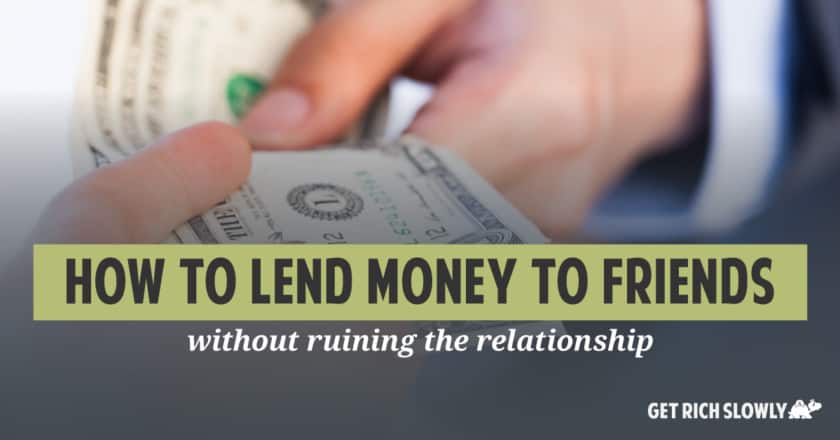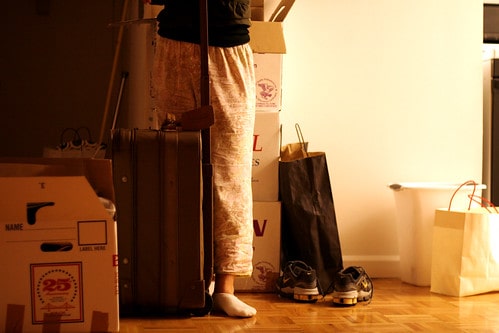How to lend money to friends (without ruining the relationship)

Lending money to friends and family is a generous act — one that could easily backfire and even ruin your relationship. Most of the time when someone is considering a loan to a family member, I think, "Don't do it." There can be other ways to help. But when it's someone you care about, logic only plays one role in the decision-making process.
Not too long ago I was in this situation. (I want to share it, but obviously I also want to be sensitive about revealing personal information, so I'm changing names and other minor details.)
I've been friends with Megan for almost 10 years. In that time, she's never had much money, but she also never asked for so much as $5. Last year, she and her boyfriend rented an apartment. A month later, he lost his job, and she had to go on medical leave. He couldn't find another job, and she had tried to return to work but her doctor wouldn't sign the medical release (it was still too early). To complicate things, they had a child. I knew my friend, and I knew she was only asking for help because of her child. They were behind on rent, and although she had just started back at work, she wouldn't see a paycheck for another two weeks. Continue reading...
All Value is Perceived Value
A lot of folks hate advertising, and it's hard to blame them. But in a 2009 TED talk, ad man Rory Sutherland argues that what advertising creates — perceived value — doesn't deserve its bad reputation.
If you want to live in a world with less Stuff, for example, your two options are:
- Live in a world that's poorer, which most of us don't want to do.
- Live in a world where greater value is placed on the intangible — which can conserve resources
Confused? It all comes down to your perception.
<Underachievement and the all-or-nothing mindset
There have been a slew of great articles lately on why resolutions fail, and I agree wholeheartedly with them. I've never had much success with resolutions myself — they always fall by the wayside after a few months, and by summer I don't even remember that I'd set resolutions in the first place.
Nevertheless, I set a lot of goals in 2010 that I reached. For example, last year I accomplished the following goals:
- Learned how to hang out in the pose pictured at right, which gave me a lot of confidence on and off the yoga mat
- Completed yoga teacher training
- Quit my job to freelance full-time
- Started learning to play piano (again, but with some dedication this time)
- Traveled to New York City at Christmastime
- Began to explore cooking French cuisine, starting with crème brulée
- Saved up a decent sum of money to start building our house
These weren't New Year's resolutions. They were goals I'd had for anywhere from six months (headstand) to 10 years (piano). I decided to achieve them and made small changes that would get me closer to reaching them, such as adding a 15-minute appointment to my calendar to practice piano. Sometimes I slacked off and ignored my small-step to-dos, but most of the time I stuck with it.
Women and Money: Slaying Stereotypes and Facing Reality
Do women need specialized personal finance resources specific to our gender? That's what some financial advice books seem to imply. Slate writer Hannah Seligson points out that bookseller Amazon.com has a "money management for women" category, but no category specifically for men.

- Shoo, Jimmy Choo!: The Modern Girl's Guide to Spending Less and Saving More
- Does This Make My Assets Look Fat?: A Woman's Guide to Finding Financial Empowerment and Success
- Addicted to Shopping and Other Issues Women Have with Money
- Divanomics: How to Still Be Fabulous When You're Broke
- How to Shop for Free: Shopping Secrets for Smart Women Who Love to Get Something for Nothing
There seems to be a general theme around spending. Even as I was writing this post I saw an episode of Everybody Loves Raymond where, to cover up his own overspending, Raymond blames his wife Debra for compulsive spending.
How to Avoid Sneaky Airline Fees
Last Friday I arrived home from New York City after a week of Broadway, museums, twinkling holiday lights, and more cannoli than any one person should consume. (Thankfully, I spent plenty of time walking them off!) Visiting the city in December was on my life list of things I wanted to do, and it didn't disappoint.
Of course, New York City isn't inexpensive. But my husband and I stayed with a friend, which meant we didn't have to pay for a hotel room, and we lucked into a few deals. For example, our friend used his corporate discount to get reduced-price tickets to The Metropolitan Museum of Art, and we scored $25 tickets for front-row seats to Wicked through a lottery drawing held two hours before the show. I'd also prepared myself to expect higher prices so that I could relax a little and enjoy the first big vacation we've taken in almost three years. I can say in all honesty that every expense was worth it — especially the cannoli.
But want to know what travel expenses are not worth it? The new fees airlines charge for everything imaginable! Need to check two bags? That'll be $60. Want a pillow? That's $7, and we only take credit cards. Continue reading...
How to slay energy vampires
There are demons that can suck the life force from you — and you unknowingly invited them into your home. Vampire electronics may not suck your blood, but they'll drain you of nickels and dimes for every dollar you spend on energy.
The Cost of Vampire Energy
Vampire energy is the electricity that electronics and appliances drain from the power grid when you aren't using them. Some electronics that are turned off still suck energy in standby mode, especially those with the following features:
- Internal clock
- External clock display
- Panel display LED
- Remote control sensor
- Battery charger
- Power-conversion pack
- Portable units with a base (such as a cordless phone)
According to the U.S. Department of Energy, vampire electronics are responsible for 5-10% of residential energy use. In other words, if you slay your energy vampires, and you'll see a noticeable difference in your energy bills. CNN reported that you might have as many as 50 vamps lurking in your midst: Continue reading...
Giving away, not selling, my stuff

The result of deleting items from drawers and hangers is two large brown boxes taking up floor space in the closet, overflowing with castaways. The boxes have grown into mountains, and I can't walk to the back of my closet anymore.
My intention was to sell these items, which are the nicer things that I actually like, but don't work for one reason or another. I didn't want to drop them off at the consignment shop because the shop keeps 60% of the profit and only accepts in-season clothing, meaning I'd have to keep some of this Stuff in my closet for almost a year. So I planned to sell it on eBay, thinking I could make some of my money back and maybe sell the out-of-season items.
Using Consumerism for Social Good
When I shampoo my hair, I'm helping buy bicycles for girls in Togo to get to school.
According to UNICEF, in Togo, a small nation in West Africa, about half of the women 15-24 years old can't read or write, and the numbers are higher for those in rural areas where there's no access to transportation. Children have to walk 5 to 15 miles, and girls, who typically have more household chores than boys, are particularly likely to drop out before secondary school.
You're probably wondering what bikes in Africa have to do with shampoo. All costs of the Bicycles for Education project — shipping, bike repairs, distribution, and follow-up costs — are paid for through the sales of Alaffia products. Alaffia is a line of hair and skin products made from fairly traded, handcrafted shea butter. While the pros and cons of fair trade certification have been debated, Alaffia founder Olowo-n'djo Tchala, who grew up in poverty in Togo, puts the African communities first, with direct involvement in the entire process and 10% of sales going to community empowerment projects. The current list of projects includes the following:
Banker to the Poor: Book Review and Summary
When J.D. announced that this week would be Book Week at GRS, I was excited about a set deadline for tackling a book from my ever-growing reading list. Since micro-finance and micro-credit have been of interest to me for the past four years or so, I decided to read Banker to the Poor: Micro-Lending and The Battle Against World Poverty by Muhammad Yunus. (J.D. reviewed the same book in 2007. Read his take here.)
Nobel Peace Prize winner Yunus is the founder of Grameen Bank, an organization that helps the world's poorest, especially women, escape poverty through micro-loans, which are small loans given to start a business.
Banker to the Poor chronicles Yunus' journey from a "bird's-eye-view economist, teaching elegant theories in a classroom, to a worm's-eye-view practitioner" and the creation of Grameen, a bank owned by its poor borrowers that boasts a loan recovery rate of 97.29%.
How to replace six vital documents

You're supposed to store vital documents in a fireproof box or keep them in a safe-deposit box, but how many of us actually do that? We may not need these papers often, but when we do need them, we really need them. You need vital documents to sell your car, travel overseas, apply for a job, get through an audit, refinance your house, and more.
The good news is that if you've lost important pieces of paper, you can replace them — and it might be easier than you think. Here's how to replace six of the most important documents in your life. Continue reading...
Become A Money Boss And Join 15,000 Others
Subscribe to the GRS Insider (FREE) and we’ll give you a copy of the Money Boss Manifesto (also FREE)


